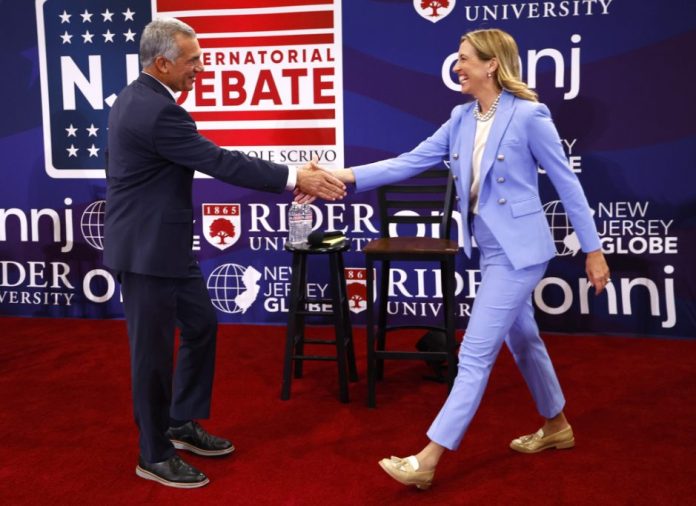EXCLUSIVE — The Republican State Leadership Committee is launching a six-figure advertising campaign in New Jersey focused on crime and the economy, the Washington Examiner has learned.
With less than a month until voters head to the polls to cast ballots in the Garden State’s hotly contested gubernatorial election, the GOP is launching four new ads, two via video and two on the radio, charging that Democratic leadership has led to rising electricity prices and an uptick in crime. Crime and the economy are two issues for which recent polling suggests voters heavily prefer Republicans.
“New Jersey remains one of the most expensive states to live in, but it doesn’t have to be this way,” RSLC President Edith Jorge-Tuñón said in an advance copy of a press release obtained by the Washington Examiner. “The Democrats controlling Trenton have continued to lean in on the same failed policies and we are calling them out on it. The people of the Garden State are tired of the status quo and are craving leaders who will actually fight for them and make New Jersey a better place to live and raise a family.”
POLITICAL VIOLENCE ON THE RISE IN THE US: A TIMELINE OF KEY INCIDENTS
The RSLC is the GOP committee tasked with winning state and local elections. Republican nominee Jack Ciattarelli is locked in a tight race with Democratic nominee Rep. Mikie Sherrill in what has traditionally been a solidly blue state.
“We don’t feel safe,” the narrator of one of the new Republican radio ads says. “Trenton Democrats protected criminals over our communities. They restricted police officers from chasing down criminals. Radical cashless bail policies allow criminals to leave jail the day they’re arrested. Gov. Murphy mass-released criminals, reduced sentences, and handed out more clemencies than every governor in New Jersey over the last 30 years combined. And don’t even get me started on New Jersey being a sanctuary state. Trenton Democrats’ soft-on-crime policies are putting us at risk. It’s time for a change.”
New Jersey’s Democratic attorney general in December 2020 banned police officers from pursuing car thieves, a decision that was reversed in April 2022. The state’s Democratic leadership effectively eliminated cash bail in 2017, and as of Sept. 9, Gov. Phil Murphy (D-NJ) has issued 169 pardons and commutations — more than all the state’s previous governors combined over the past 30 years. Crime in New Jersey remains above pre-pandemic levels.
Polling released by Ipsos in late September found that 44% of adults trust Republicans more on crime, compared to just 22% favoring Democrats. On the economy, the split was 39% to 32% in favor of the GOP. The RSLC’s ads also touched on immigration, an issue on which the Ipsos poll found most favor the Republican Party by a margin of 13 points.

“$200 more,” a New Jersey resident said in one of the new radio ads being pushed by the RSLC. “I know my electric bill. I was shocked. I’m very disappointed. This is, this is killing us.”
The ad goes on to blame “failed Democrat policies” for driving up energy costs by over 20% in New Jersey. Republican critics argue that the increase in costs is tied to Murphy’s decision to shutter nuclear and coal power plants without clear replacements, whereas others maintain that the region’s grid operating company is increasing prices due to increased demand from data centers combined with a shortage of power plants.
Energy costs have become a central issue in the race for the New Jersey governor’s mansion, with both candidates trading barbs over the increased rates.
The video ads produced by the RSLC echo similar, albeit truncated, arguments as their radio counterparts.
NEW JERSEY GUBERNATORIAL CANDIDATE TOOK LARGE DONATIONS FROM CCP-LINKED AUTO EXECUTIVES
Polling shows a tight race in traditionally blue New Jersey as Nov. 4 approaches. Real Clear Polling’s aggregate of surveys has Sherrill leading Ciattarelli by just 4 points, while some high-profile pollsters like Emerson College have the duo tied.
The RSLC has been highly active in New Jersey in the lead-up to the election, spending $1 million on a voter mobilization strategy aimed at disseminating absentee ballot mailings, follow-up communications, and early voting information with emphasis on reaching low-propensity voters.

